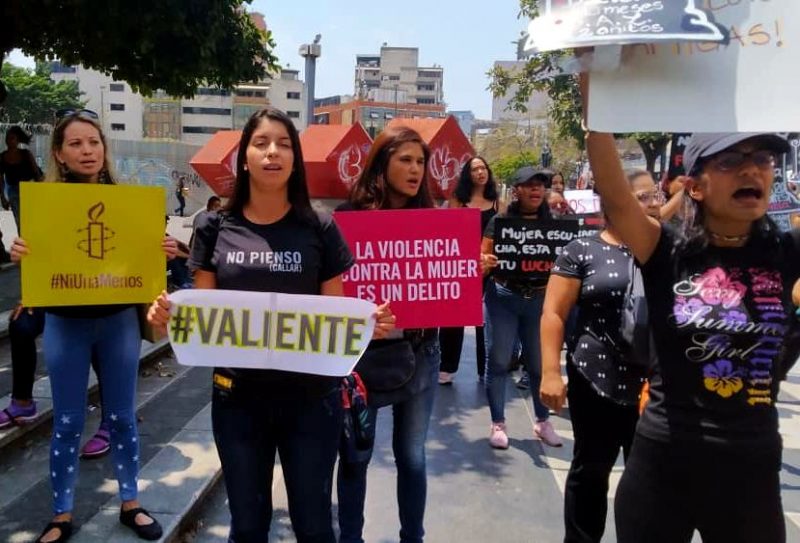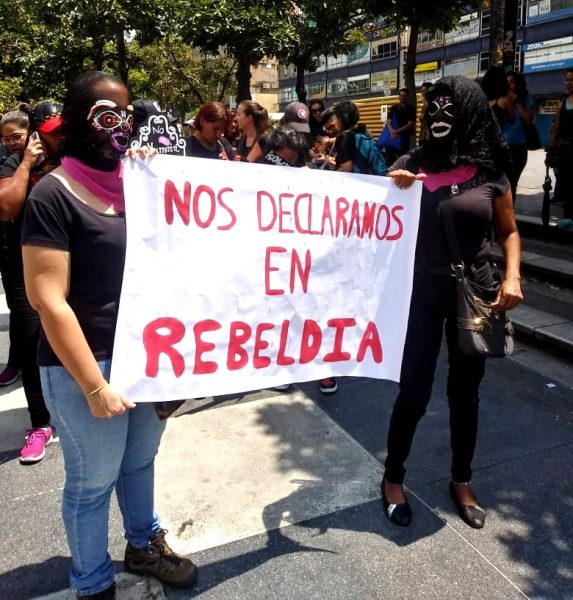
March 8, 2020 demonstration in Caracas, Venezuela. Photo courtesy of Uquira. Used with permission.
Check out Global Voices’ special coverage of how women fight gender violence in Latin America [1].
In Venezuela, feminists seem to be achieving what no other movement in the country has accomplished in the past 20 years: transcending political divisions and denouncing the increasingly precarious situation of women in Venezuela.
In 2019, 391 women were killed in Venezuela, according to a database compiled [2] by a local media team from digital news articles, in the absence of official records.
But women’s situation in Venezuela is also a crisis within a crisis. Aid experts classify [3] Venezuela as a complex humanitarian emergency [4]—essentially a political or politicized human-made crisis that has created severe shortages of medicines (including contraceptives), supplies (including personal hygiene items) and food. Add to this the 16,506 violent deaths [5] Venezuela experienced in 2019, making it one of the most violent countries regionally and globally. This state of affairs has pushed 4.9 million Venezuelans [6] outside of the country as migrants or asylum seekers.
Since 2014, there have been protests to oust President Nicolás Maduro, who is accused of corruption and overall inefficient governance. In 2019, Juan Guaidó declared himself interim president, further polarizing the country.
Against this tumultuous backdrop, any social movement is easily labeled either “pro-Maduro” or “pro-opposition”.
In December 2019, it appeared as if feminists were dividing themselves along these lines, as women's groups in Venezuela organized [7] separate protests to perform the Chilean feminist collective Las Tesis's “Un Violador en Tu Camino” (“A Rapist in Your Path”), as feminist groups in many other countries were doing at the time [8]. Pro-government and anti-government protestors in Venezuela refused to sing together.

March 8, 2020 demonstration in Caracas, Venezuela. Photo courtesy of Uquira. Used Used with permission.
By March 8, 2020, however—International Women's Day—it had become clear that the country's feminists had put their politics aside. Feminist collective Uquira organized [9] an International Women's Day march that was joined by organizations with a range of political views, such as Comadres Purpuras [10], Red de Mujeres of Amnesty International [11], Fundamujer [12], Hermanas Naturales [13], WeLab Venezuela [14], Aliadas en Cadena [15], Feminismo Inc [16], En Tinta Violeta [17], Faldas-R [18], Araña Feminista [19] and others.
The number of participants was modest—a bit over 100 people [9]—but it keeps increasing every year.
The feminist collective Comadres Purpuras tweeted [20]that they refused to be “used” by the government or the opposition:
#MitinDeMujeres [21] ✊ #PorTodasLasMujeres [22] ?#9M [23]
Nuestra apuesta y proyecto está en la reconstrucción del tejido social que ha sido utilizado bajo una lógica de capitalización propagandista por factores oficialista y de la oposición tradicional.
? https://t.co/YIgRAVcXRw [24] pic.twitter.com/yTixxSFeVV [25]
— Comadres Púrpuras? (@comadrepurpura) March 8, 2020 [26]
Our proposal and our project want to reconstruct the social tissue that has been used as propaganda by the government and the traditional opposition.
Unsupportive political agendas
Venezuelan feminists denounce the lack of action taken to prevent femicides and prosecute aggressors, despite a 2014 legal reform [27] recognizing femicide as a crime. In the 554 officially recognized femicides in the past two years, only 119 sentences have been handed down [28]. On paper, Venezuela has adequate legislation to combat gender violence, but budgets are not made public and law enforcement is scarce.
In addition to gender violence, women's economic vulnerability has also appeared to unite feminists. The minimum monthly salary in the country is less than US$4 [29], which prevents women from accessing basic items, healthcare, contraceptives, and forces them to stay in violent relationships or migrate under precarious conditions, risking sexual abuse and exploitation.
Feminists want to recover the spaces occupied by the dominant political parties because both the government and the opposition appear to be failing to solve gender violence.
Guaidó's National Plan [30], the roadmap that will guide Venezuela if he ever attains the formal presidency, makes no mention of tackling violence against women nor proposes any measure to solve the gender-specific problems women are facing under the current administration.
Maduro's government portrays itself as feminist, but it is characterized by powerless institutions and general indifference. The Minister for Women and Gender Equality, Asia Villegas, talked [31] about gender violence in Colombia and Mexico during a government-led event on March 8, ignoring the situation in her home country of Venezuela.

March 8, 2020 demonstration in Caracas, Venezuela. Photo courtesy of Uquira. Used with permission.
In 2014, the UN Committee on the Elimination of Discrimination against Women recommended [32]to Maduro's government a series of changes to decriminalize abortion under certain circumstances, reduce the rate of teenage pregnancies (95 out of 1,000 women [33] in the 15-19 age group become pregnant in Venezuela, the second-highest teenage pregnancy rate in the Americas after Honduras), reduce the maternal mortality rate, and take concrete steps to tackle gender violence.
In November 2018, the Inter-American Court of Human Rights concluded [34] that Venezuela was responsible for “enabling acts of torture and sexual slavery” committed against prominent women's rights activist and lawyer Linda Loaiza [35]. Yet, on November 18, 2019, Loaiza complained [36]that the Venezuelan state has not yet acted upon the Court's orders for measures of reparation.

“Nos Declaramos en rebeldia” (“We declare ourselves in rebellion). in March 8, 2020 demonstration in Caracas, Venezuela. Photo courtesy of Uquira. Used with permission.
On March 8, women demanded abortion rights too. Abortion remains a clandestine activity due to the legal restrictions in Venezuela, one of the most conservative [37]jurisdictions in the region. Unsafe abortions are responsible for an estimated 20% of maternal deaths in Venezuela, according to a 2019 report [6] from the United Nations High Commissioner, Michelle Bachelet. Also, in a report from 2016—the last year records were made public—it appears that 66% more women [38] died because of maternity complications compared to previous years. A proposal [39] to decriminalize abortion was submitted by different activist groups to legislators in June 2018, with no results so far.
In the days leading up to March 8, President Maduro declared [40] that “women should have 6 kids and let the homeland grow!” —a highly irresponsible assertion considering the figures above.
Except for Henrique Capriles, a former governor and Presidential candidate in 2012 who supported [41] therapeutic abortion, opposition leaders have never made pronouncements on this topic.

“El Estado no me cuida! Me cuidan mis amigas!”(“The State doesn’t take care of me, my female friends do.”) March 8, 2020 demonstration in Caracas, Venezuela. Photo courtesy of Uquira. Used with permission.
On March 8, as neither government nor the opposition appears to be working to stop the violations against women, Venezuelan feminists from different political spectrum gathered to say:
“El Estado no me cuida! Me cuidan mis amigas!”
“The State doesn’t take care of me, my female friends do.”